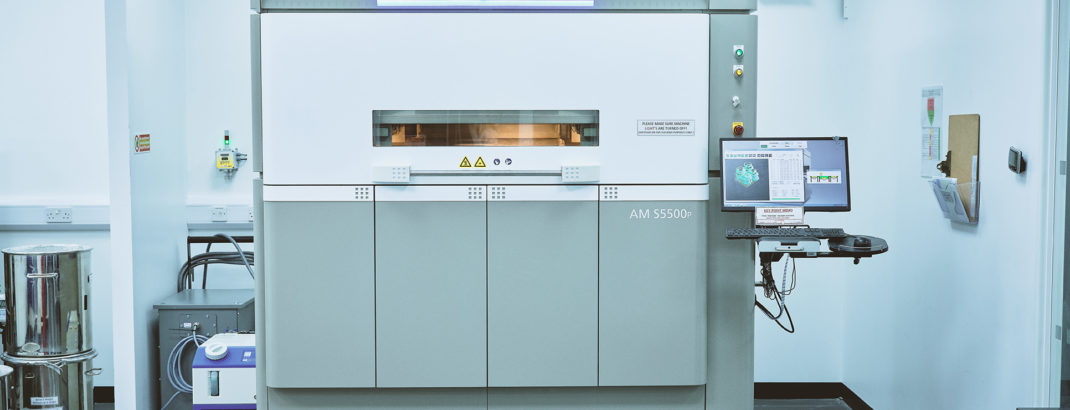3D printing has exploded into public consciousness over the last couple of months, writes Mark Dickin.
Despite best efforts to educate and demonstrate 3D printing’s far-reaching capabilities, many people – manufacturers as well as the general public – did not really understand how the technology could be used in the ‘real world’. Fascinating? Absolutely. But truly useful? The jury was out for some.
The covid-19 pandemic means that is all changing.
The 3D printing industry has been high on the news agenda with companies and individuals coming up with ingenious ways to support the national and international effort, whether that’s by producing face shields, parts for ventilators or swab test kits.
It really feels like a corner has been turned.
At Ricoh 3D, we continue to play our part in protecting essential workers by producing comfortable and cost-effective face shields, not just for the NHS but also for businesses considering the measures that will be necessary to keep staff and customers safe as we emerge into the ‘new normal’. Here, the true power of 3D printing was in the supply chain – often overlooked – with manufacturers like Ricoh 3D able to switch up production overnight as the Covid-19 pandemic unfolded.
With additive manufacturing key for short term demand of vital PPE, we recognised quickly that long term supply called for the cost efficiencies of injection moulding. Two weeks into the pandemic, investments were made in injection mould tooling to deliver the ongoing high volumes required. With capacity to produce up to 40,000 face masks every week, we are ready to meet demand across the retail, hospitality and education sectors too as they now return to workspaces.
Meanwhile, our engineers have been working on a range of 3D printed products that will help keep offices, schools and public spaces safe. Across the Ricoh Family Group we’re printing grab handles which allow objects to be picked up without direct contact and personal hooks for every employee to open doors touch-free.
Rest room controls are a very simple sliding indicator which is child-friendly and allows the number of people inside rooms to be controlled and clearly communicated, for facilities with occupancy limits. The occupant simply slides the counter over using their personal hook to indicate their presence.
We’re ready to make these controls available beyond our own group, to support the phased return to work for businesses across the country.
Elsewhere, we’re seeing hospitals and NHS Trusts utilise their own small-scale 3D printers to create face shields on demand. Any organisation with 3D technology has the ability to switch up their production instantly – from motorsport to medical parts overnight.
Other companies, notably in Italy, have been able to quickly and cheaply create crucial parts for ventilators. Those using traditional manufacturing methods simply weren’t able to respond in the same way – bringing a product from concept to reality in days with additive manufacturing, instead of weeks or even months with alternative techniques.
In parts of China when the Covid-19 spread was most rampant, engineers went a step further by 3D printing entire quarantine rooms. According to Winsun, the company behind the rooms, the printed walls are three-times stronger than traditional concrete walls.
Meanwhile, in the US an Army-Navy partnership is producing and delivering 3D-printed nasal test swabs for testing. It has now prompted the US Navy to look at what submarine parts could be 3D printed.
Perhaps the most inspiring development during the crisis has been individuals with home 3D printers rallying together to produce face visors for their local communities. Using online hubs to establish the need, volunteers have been able to download pre-prepared CAD files and simply hit print at home. Naturally there are unanswered questions over safety standards, and discussion points around liability should one of the parts fail, but it’s reawakened the community spirit to put together stopgap measures as existing supply lines struggled to keep up.
At Ricoh 3D we are in the process of obtaining CE approval to ensure that demand can be met throughout the UK and Europe, with the assurance that our masks are offering medically-approved protection.
We have been proud to prove our medical credentials and play our part in the Covid-19 battle – and see 3D print production given the platform it deserves in the manufacturing arena. No other technology can offer the same speed as 3D print production – speed of design iteration, part production, and fulfilment.
Now the world is looking to additive manufacturing for medical and safety solutions – but the opportunities really are endless across all sectors. 3D printing has proven its place in British manufacturing, but now is the time to finish what we’ve started and continue the good work. The 3D print revolution is finally here.
